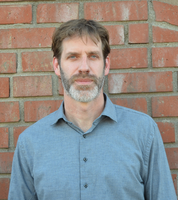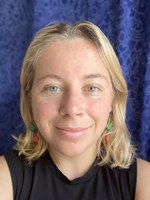Creative Writing Contests
The Calvino Prize
The Calvino Prize is an annual fiction competition sponsored by the Creative Writing Program in the English Department of the University of Louisville. They will be awarded to outstanding pieces of fiction in the fabulist experimentalist style of Italo Calvino. Please note that these prizes are meant to encourage experimental writing, in the mode of Calvino, and are not meant to encourage merely imitative work.
The winning entrant will receive $2000 will be published in Miracle Monocle, the University of Louisville's award-winning online literary journal. One runner-up (if named by the final judge) will receive $500. All contest finalists will be posted on the website.
First Place: $2000 and Publication
Second Place: $500
Submission Guidelines
Past Winners
2024 Calvino Prize Winner:
 David Lawrence Morse’s “The Memoir”
David Lawrence Morse’s “The Memoir”
Originally from south Georgia, David Lawrence Morse studied in Russia after the collapse of communism, cleaned toilets in Yosemite, and taught English then lived on a rice farm in the foothills of Yamaguchi, Japan. His first collection of stories, The Book of Disbelieving, won the Mary McCarthy Prize in Short Fiction and was published by Sarabande Books. His short fiction has also garnered an O. Henry Prize and appeared in various literary magazines. The Washington Post published his essay on the moral and political complexity of mendacity, and his first play, Quartet, was performed by the Takács Quartet and the Colorado Shakespeare Festival. He is the director of the writing program at Yale’s Jackson School of Global Affairs. To learn more about Morse's teaching and writing, visit: www.davidlawrencemorse.com/
Of the winning story, judge Elizabeth Crane had this to say: “First: the conceit of this story is brilliant. I will resist giving it away because I do not want to deprive the reader of the delight of that discovery, but it will forever live in my brain cache of things I wish I’d thought of myself. Thematically, the story successfully weaves in multiple topics that speak to contemporary concerns within an incredibly fresh structure, and the humor throughout just adds to all the components that make the story work so well. (What had Ron Howard done that made him so special? will henceforth make me giggle whenever that name emerges.) But in the end, it’s the development of the character of Irene Canter that made this the winner for me: the compilation of the way her life story emerges adds up to the victory of any average person alive. It tells me we all matter, validates my personally long-held belief that what makes up any life is always compelling, especially if we look deeply enough as the author has done so very well here.”
Runner-up
 Kira Nolan’s “Kelp Forest Love Story”
Kira Nolan’s “Kelp Forest Love Story”
Kira Nolan studied astronomy, physics, and creative writing at Vassar College. She now lives in Pasadena, California, where she does astrophysics research. She would like to dedicate this story to her genius English teacher H, who introduced her to Calvino.
Judge Elizabeth Crane says of “Kelp Forest Love Story”: “‘Immersed’ is one of those blurby words you hear fairly often and yet here it is so exactly right that I would be remiss not to use it. The skilled and lovely prose drew this universe, and its women, in such beautiful detail that I felt that I was right there in this delightfully kelpy underwater world, sipping moonshine with my kelp women, free of the burdens of above. And above all, it felt like there was a real beating heart here that made it a very close second for this prize.”
Finalist
Remy Barnes’ “Horses”
Naomi Elegant’s “Kurdistan”
Hillery Hugg’s “The Greyhound”
Christina Milletti’s “Poached”
Mary Jane Nirdlinger’s “Puff”
Brian Price’s “Wasting Disease: A Story”
Colleen Rosenfeld’s “The Skilled Anatomist”
Christy Sheffield Sanford’s “The Complaint”
Hillary Woolley’s “Fibonacci Sequence”
